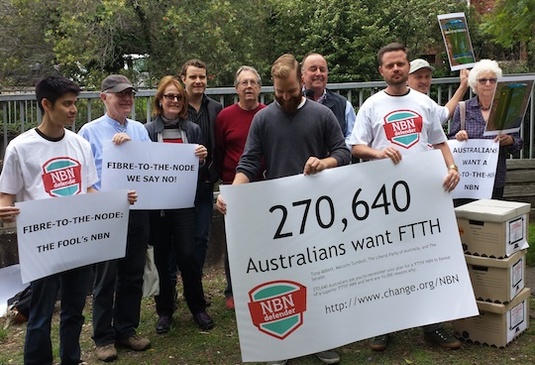This article is more than 1 year old
Surprise! Government mega-infrastructure project cocked up
Australia's National Ballsup Network
Worstall on Weds That Australia's National Broadband Network is late, over budget and chaotically managed will come as no surprise to aficionados of government infrastructure projects. It's just the latest in a long and inglorious rollcall of politicians pissing our money away on things they simply don't understand.

Protestors at the NBN Day of Action. Photo by Simon Sharwood
To an economist, the very worst of this is contained in this quote from the recent report into the calamity:
There was no business case or any cost-benefit analysis, or independent studies of the policy undertaken, with no clear operating instructions provided to this completely new government business enterprise, within a legislative and regulatory framework still undefined, and without any consultation with the wider community.
Leave aside the particular methods of this cock-up, even the goal being attempted and just savour that most important part: no business case or any cost-benefit analysis.
They decided to spend Au$43bn (£24bn, $40bn) without actually working out whether it was worthwhile or not. That the price tag has now ballooned to Au$70-odd billion (£38bn, $65bn) and rising isn't the worst part of this: the worst part is that the government did not do that cost benefit analysis (CBA).
Value: It's worth determining before you spaff the cash
Now economists have been derided enough over the years for knowing the price of everything and the value of nothing, but here the problem is that no one actually bothered to look at the value.
Sure, it would be nice if every household in Oz had fibre to the doorstep. We could even posit that this will be a “vital part of the wired future” or whatever other fatuity one wants to express at a press conference. But we do actually need to sit down and ponder whether the resources we must expend in order to get this are worth the value we get from having expended those resources. That is, are we adding value to our world by doing this or not?
This involves doing sums: CBA. As an example of how to do it correctly, consider the report into the Severn Barrage, which made the case for damming the Bristol Channel and Severn Estuary. The first benefit was that by so doing the UK could generate lots of hydro-electricity over the next century or so. We also wouldn't have to pay for gas to power electricity stations, there's a value to the CO2 we'll not be emitting, we'd dam up some feeding sites for wading birds and so on. We'd also have to buy a shitload of concrete. Great, tot it all up and the result is that the bigger we build it, the more money we lose. We make ourselves poorer so therefore we'll not do it.
As another example of how to do a CBA correctly, consider HS2. The fundamental case here is that faster train travel saves travel time. We assume that time spent travelling is wasted, so we value it at what people could be earning if they weren't travelling. Thus business class passengers get their time valued at £50 or £70 an hour.
That was fine 20 years ago: now we all work on laptops and mobiles and so travel time is not wasted time. Once the HS2 CBA was revised to reflect this new reality, it failed the CBA – whereas it passed it under the old rules.
This does all depend upon the assumptions one makes, of course. The Stern Review into climate change is really just a CBA into that subject. By assuming a high emissions path (instead of, properly, weighting all of the business as usual paths) plus a low discount rate, Stern tells us that there should be a carbon tax of $80 per tonne of CO2-e. Others use the same method but better assumptions and tell us $15 or $20. A CBA is inevitably sensitive to those assumptions: but it's still the right method to use to try to think through the problem.
Even passing a CBA isn't, in and of itself, enough. Electronic health records might even have been worth £11bn to the UK, but when that sum was spent and no electronic records system was actually delivered, it became a different sort of failure.
And of course politicians can simply flat out lie at the beginning. The Olympics, when the UK was bidding for it, was to cost £2bn and change. Final cost was somewhere over £20bn, including that amazing admission that the government had “forgotten” that it would have to charge itself VAT.
As above, economists have been derided for that price and value thing often enough. And yet they still get ignored when they're trying to point out that we've got to consider the value of such projects.
Shiny-shiny tech might look very good to a politician in search of a few votes, but it's still necessary to ask the obvious question: “Is it worth it?” And the answer to that will come from doing the sums.
Add up the value that will be produced by whatever it is, subtract the costs of doing it and if the number's positive then go for it, if negative, then bin it.
And that was the great crime of the NBN project planners. They just didn't bother to do their sums over whether the lovely idea was worth it or not. Demanding a cost-benefit analysis on a government project should be something we demand as routinely as the famous “citation needed” we insist upon when someone proffers a fact on the internet. ®
